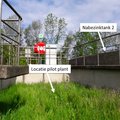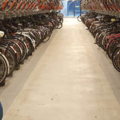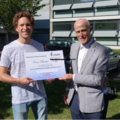Latest news
22 March 2022
AdOx – from laboratory research to pilot plant research

After almost four years of lab research, the AdOx process will be tested on pilot plant scale. AdOx is an innovative technology for removal of organic micropollutants (OMPs), such as pharmaceuticals, from domestic wastewater effluent. It combines adsorption with oxidation: zeolite granules remove OMPs from treated wastewater effluent by adsorption in a fixed bed filter, and the zeolite filter is regenerated with ozone gas after the zeolite granules are exhausted. The process is very selective for OMPs, cost-effective and extremely sustainable: the CO2-footprint is low, no bromate and oxidation by-products are released to the receiving surface water, and the ozone use is low. It is a very competitive technology compared to GAC filtration and direct ozonation of wastewater effluent.
21 March 2022
CEG participates in setting up the first Lithium production line in Europe
Lithium is a scarce resource that is essential for the production of batteries. Yet batteries we urgently need to enable the energy transition, as they provide efficient ways to store wind and solar energy. We therefore need ways to process lithium more efficiently, techniques to refine and ways to recycle. A consortium of European companies and universities, including TU Delft’s Resources & Recycling group, aims to set up the first-ever Lithium supply chain in Europe.
17 March 2022
A match made in heaven

Every opinion counts! But how can Dutch Rail (NS) accommodate to the wishes of a wide range of train travellers when creating the perfect match between bike use and public transport? Master student Civil Engineering Simone Hoskam was happy to tackle this real-life transportation challenge. In the end she presented Dutch rail company NS with some straightforward recommendations to make the relationship between bike and train an even happier one.
10 March 2022
Using VR for understanding interactions between automated vehicles an vulnerable road users
Virtual Reality (VR) provides possibilities to obtain complete experimental control and automatically collect behavioral data of vulnerable road users when interacting with automated vehicles. The usage of VR has attracted strong attention to play a key role in studying and better understanding interactions between autonomous vehicles and vulnerable road users.
09 March 2022
Herman Russchenberg in podcast BNR-duurzaam

Van aerosolen in de lucht tot spiegels in de woestijn. Wetenschappers onderzoeken hoe we de temperatuur op aarde kunnen beïnvloeden met cosmetische ingrepen.
07 March 2022
Underground storage of hydrogen - Catalyst of sustainable energy transition
24 February 2022
Cees Boeter Award 2019

The Department of Water Management is proud to announce the winner of the Cees Boeter Award for the best BSc thesis written in the 2018-2019 academic year.